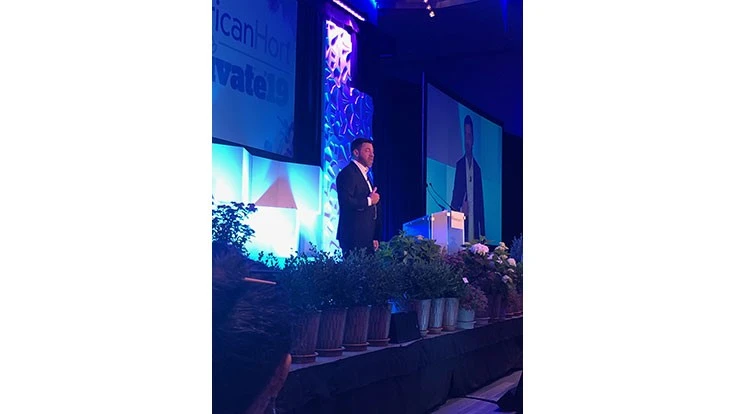
Kate Spirgen
People say heroes are ordinary people who do extraordinary things, but Kevin Brown disagrees. “That assumes that you’re ordinary to begin with,” said the author of “The Hero Effect” at this keynote speech during Cultivate’19 in Columbus, Ohio.
Instead, Brown defines heroes as extraordinary people who choose not to be ordinary. He asked the audience to think back to when they were kids and they thought they could do anything. When someone in his neighborhood got a new washing machine or a new refrigerator, the kids were all excited for a chance to play in the box because it could be anything.
“But now it’s just a box,” he said. “The box is so vile that we were thought to think where? Outside of it.”
But the box is nothing more than the rules of the game – the rules of engagement. He talked about the respect he has for those who never lost the ability to put their uniqueness on that box. Those are the people he chooses to do business with.
Brown told the story of the woman who cuts his hair. From the minute he sat down in her chair, she went above and beyond for him, giving him a shoulder massage and asking about his life, his stresses and his preferences for a haircut.
“I’d drive by 20 salons just to get to her,” he said. “Isn’t that what you want for your business? To be THE choice, not A choice?”
And the best way to give that to people is to make sure that they feel heard. “Everyone wants to be seen and heard, and to know that they matter,” Brown said.
There’s competition for every single relationship in your life and when you aren’t able to give people the attention they need, it’s easy to blame it on anything else – the weather, the economy or other people.
“Heroes stand up and do the best they can no matter what else,” Brown said.
But when people feel appreciated, they’ll keep coming back to your business. And Brown did that exact thing when he took his family to Disney World. His son, who is autistic, had a lot of dietary restrictions, and when they went out for their first breakfast, they met with the restaurant’s executive chef, Bea.
Bea listened to everything Brown’s son could and couldn’t eat and then asked exactly what he’d like for breakfast. He wanted apple pancakes, but Bea didn’t have the right ingredients.
When the family came back for breakfast the next day, Brown’s son made the same request. And Bea said yes, because she had stopped at the store on her way home the day before and picked up everything she would need to prepare them. The family ate at that same restaurant every single day for the rest of their vacation.
“Nobody notices when you’re satisfied, but most organizations are chasing satisfaction,” Brown said. “Satisfaction doesn’t get you a ticket to the dance.”
Latest from Garden Center
- Rosy Soil raises $3.6 million to create gardening soil from captured CO2
- Construction begins at Dramm’s Fish Fertilizer Facility in Wisconsin
- Monrovia research reveals gardening attitudes for 2025
- American Horticultural Society releasing two new books
- Monarch butterflies, other pollinators to benefit from $5.2 million in conservation grants
- Bower & Branch launches Design Studio
- Seed Your Future, NC State launch 2024 Horticulture Industry Salary & Benefits Survey
- Pantone announces its 2025 Color of the Year





